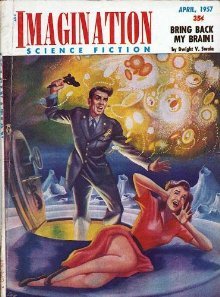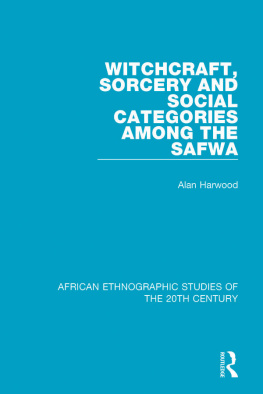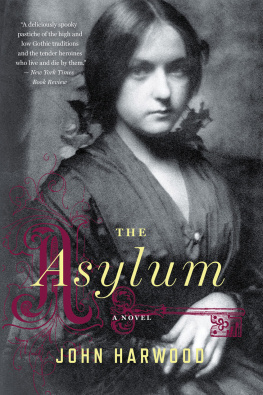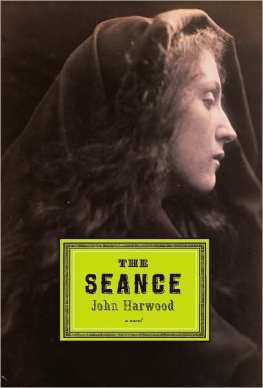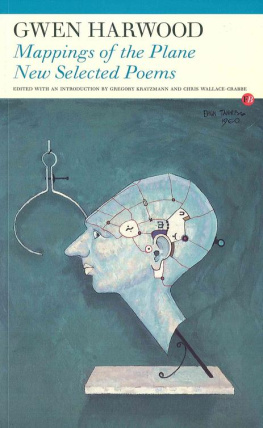John Harwood - The Asylum
Here you can read online John Harwood - The Asylum full text of the book (entire story) in english for free. Download pdf and epub, get meaning, cover and reviews about this ebook. year: 2013, publisher: Houghton Mifflin Harcourt, genre: History. Description of the work, (preface) as well as reviews are available. Best literature library LitArk.com created for fans of good reading and offers a wide selection of genres:
Romance novel
Science fiction
Adventure
Detective
Science
History
Home and family
Prose
Art
Politics
Computer
Non-fiction
Religion
Business
Children
Humor
Choose a favorite category and find really read worthwhile books. Enjoy immersion in the world of imagination, feel the emotions of the characters or learn something new for yourself, make an fascinating discovery.

- Book:The Asylum
- Author:
- Publisher:Houghton Mifflin Harcourt
- Genre:
- Year:2013
- ISBN:9780544003293
- Rating:4 / 5
- Favourites:Add to favourites
- Your mark:
- 80
- 1
- 2
- 3
- 4
- 5
The Asylum: summary, description and annotation
We offer to read an annotation, description, summary or preface (depends on what the author of the book "The Asylum" wrote himself). If you haven't found the necessary information about the book — write in the comments, we will try to find it.
John Harwood: author's other books
Who wrote The Asylum? Find out the surname, the name of the author of the book and a list of all author's works by series.
The Asylum — read online for free the complete book (whole text) full work
Below is the text of the book, divided by pages. System saving the place of the last page read, allows you to conveniently read the book "The Asylum" online for free, without having to search again every time where you left off. Put a bookmark, and you can go to the page where you finished reading at any time.
Font size:
Interval:
Bookmark:

Table of Contents
Title Page
Table of Contents
Copyright
Dedication
Part One
Georgina Ferrars Narrative
Part Two
Rosina Wentworth to Emily Ferrars
Georgina Ferrars Journal
Rosina Wentworth to Emily Ferrars
Georgina Ferrars Journal (continued)
Part Three
Georgina Ferrars Narrative
About the Author
First U.S. edition 2013
Copyright 2013 by John Harwood
All rights reserved
For information about permission to reproduce selections from this book, write to Permissions, Houghton Mifflin Harcourt Publishing Company, 215 Park Avenue South, New York, New York 10003.
www.hmhbooks.com
The Library of Congress has cataloged the print edition as follows:
Harwood, John, date.
The asylum / John Harwood.1st U.S. ed.
p. cm.
ISBN 978-0-544-00347-7
1. Gothic fiction. 2. Suspense fiction. 3. Historical fiction. I. Title.
PR9619.4.H37A93 2013
823'.92dc23
2012039120
eISBN 978-0-544-00329-3
v1.0513
FOR ROBIN
Part One
Georgina Ferrars Narrative
I WOKE, AS IT SEEMED, from a nightmare of being stretched on the rack, only to sink into another dream in which I was lying in a strange bed, afraid to open my eyes for fear of what I might see. The smell and the texture of the blanket against my cheek felt wrong, and I was clad, I became aware, in a coarse flannel nightgown that was certainly not my own. I knew that I must still be dreaming, for I had gone to sleep as usual in my bedroom at home. Every joint in my body ached as if I had been stricken with fever; yet I had felt perfectly well the night before.
I lay still for a little, waiting for the dream to dissolve, until my eyes opened of their own accord. The ceiling above me was a dull white; the bare walls, a dismal shade of green. Grey light filtered through a metal grille; the glass behind it was clouded and streaked with moisture.
I sat up, wincing at the pain, to find myself in what appeared to be a prison cell. The door to my left was solid oak, with a narrow aperture at eye level, closed by a wooden shutter. The air was damp and chill, and smelt of cold ashes and chloride of lime. A small fireplace was, like the window, entirely covered by a stout metal grille. There was no furniture beyond a bedside table, a single upright chair, a washstand, and a small closet; there were no ornaments, no looking glass; not so much as a candlestick.
It was impossible; I could not be here. But neither could I deny that I was wide awake. And I was not, I realised, at all feverish; my forehead was cool, my skin was dry, and my breath came freely. So why did my body protest at the slightest movement? Had I fallen somehow? or been attacked?or worse? Trembling, I threw off the bedclothes and examined myself, but I could find no trace of injury, except for some bruises on my upper arms, as if someone had gripped them tightly.
Was it some sort of hallucination? If I lie down, I thought, and pull the covers over my head and try to go to sleep again, perhaps I will find myself back in my own bed. But my feet, seemingly of their own volition, were already on the floor. I moved unsteadily to the door and tried the handle, but it would not budge.
Should I call out? And who would come if I did? I turned toward the window, wondering if this was what sleepwalkers experienced. Half a dozen paces brought me to the grille. The world beyond was obscured by grey, swirling mist, with faint, unidentifiable formswalls? houses? trees?hovering at the edge of visibility.
I returned to the door and tried the handle again. This time the panel shot open, and two eyes appeared in the slot.
Where am I? I cried.
The infirmary, miss, replied a young womans voice. Please, miss, Im to say youre to get back into bed, and the doctor will be here directly.
The panel slid shut, and I heard the muffled sound of footsteps receding. Shivering, I did as she had asked, relieved at least to discover that I was in a hospital. But what had happened to me, and why had they locked me in? I waited apprehensively until another, heavier tread approached. A lock rasped, the door swung inward, and a man stepped into the room. From his dressa tweed suit and waistcoat, somewhat rumpled, a white collar which had sprung loose at one side, a tie of dark blue silk, carelessly knottedand a certain humorous glint in his eye, you might have taken him for an artist, but there was an air of authority about him, of a man accustomed to being obeyed. He looked somewhere between forty and fifty, not especially tall, but broad-shouldered and trim. His eyes were pale blue, accentuating the blackness of the pupils, deep-set and piercing beneath heavy brows, with dark pouches beneath; his nose strong and aquiline and straight as a blade, the nostrils flared above chiselled lips. A long, lean face, clean-shaven except for a fringe of side-whiskers, tapering down to a creased, prominent chin. He stood silent, surveying me appraisingly.
Where am I? I said again. Who are you? Why am I here?
A gleam of satisfaction showed in his eyes.
Do you mean you dont know?I see you do not. This is most interthat is to say, most distressing for you. Forgive me: my name is Maynard Straker, and I am the superintendent and chief medical officer here at Tregannon Houseon Bodmin Moor, in Cornwall, he added, seeing that my bewilderment had not lessened. Have no fear, Miss Ashton, I am entirely at your ser
He stopped short at the expression on my face.
Sir, my name is not Ashton! I am Miss Ferrars, Georgina Ferrars; I live in London, with my uncle; there has been a terrible mistake.
I see, he said calmly. Well, never fear. Let me order you some toast and tea, and we shall talk it all through in comfort.
But sir, I should not be here! Please, I wish to go home at once!
All in good time, MissFerrars, if you prefer. The first thing you must understand is that you have been very ill. I knowhe held up his hand to silence meI know you do not remember: that is a consequence of your illness. Now please; first you must allow me to examine you, and then I shall explain what has happened to you.
Such was the force of his personality that I waited in silence whilst he murmured instructions to someone outside the door. He took my pulse, listened to my heartbeat, tested my reflexes, and seemed quite satisfied with the result. Then he settled himself on the wooden chair so that he was facing me directly.
You arrived here yesterday morning; without notice, which is most unusual. You gave your name as Lucy Ashton and said that you wished to consult me on an urgent and confidential matter. As I was away on business, the maid referred you to my assistant, Mr. Mordaunt. You were, he says, in an agitated state, though striving to conceal your distress. He explained that I would not be back until the evening, and that you would therefore have to stay here overnight, and register as a voluntary patient in order to see me, and to this you very reluctantly agreed. You would not admit to any disturbance of mind; only to extreme fatigue, and, after giving him a few cursory details, asked if you might complete the admission forms later.
Mr. Mordaunt found you a room in the voluntary wing and left you there, assuming you would rest. But several times that afternoon he saw you walking about the grounds in what he describedmy assistant is something of a poetas a trance of desolation.
I returned at about nine oclock, and, upon hearing Mr. Mordaunts account of you, called briefly at your room to arrange an appointment for this morning; I had too many calls upon my time to speak to you last night. You were plainly in a state of extreme nervous exhaustion, but again you refused to concede anything beyond fatigue. I naturally ordered you a sedative, which you promised to take, though I fear you did not. Voluntary patients are, I should say, under no compulsion to accept any particular treatment here. So long as they pose no danger to themselves or others, they are free to do as they wish: it is part of our philosophy.
Next pageFont size:
Interval:
Bookmark:
Similar books «The Asylum»
Look at similar books to The Asylum. We have selected literature similar in name and meaning in the hope of providing readers with more options to find new, interesting, not yet read works.
Discussion, reviews of the book The Asylum and just readers' own opinions. Leave your comments, write what you think about the work, its meaning or the main characters. Specify what exactly you liked and what you didn't like, and why you think so.



